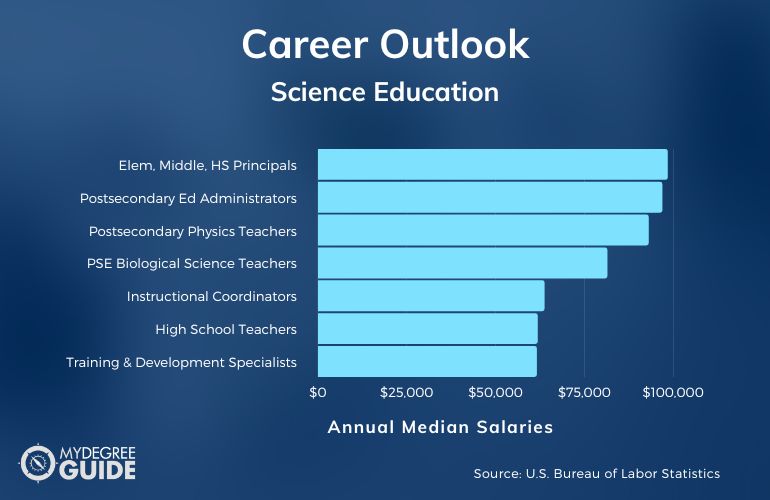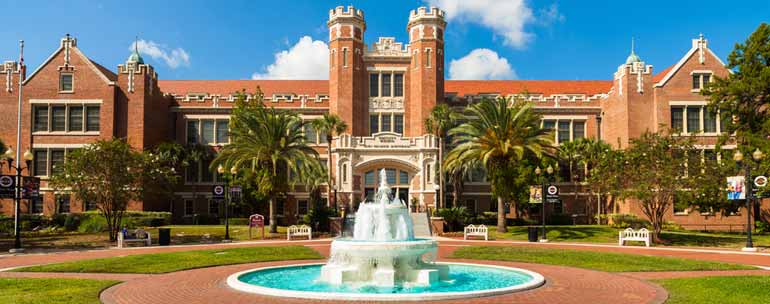A masters in science education is often the next step for individuals who are teaching in a K-12 setting and wish to increase their knowledge base and earning potential.

Science educators teach subjects like biology, earth science, physics, anatomy, and more, depending on their specialty.
Editorial Listing ShortCode:
There are many science education graduate programs available online that offer flexibility for working professionals.
Online Masters in Science Education Programs

Obtaining a master in science education degree may increase the employment options and earning potential for individuals in the field of education. This is why it is often a popular choice for practicing teachers.
A masters degree in science education can help increase your career opportunities within the field of education and training. Listed below are some advanced career paths in the science education sector:
- Community college science teacher
- Educational outreach coordinator
- Instructional coordinator
- School administrator
Most science education masters degree programs consist of advanced science courses, such as ecology and human anatomy, as well as courses in education, mathematics, and research methods.
Editorial Listing ShortCode:
Education courses in a science education program are designed to encourage mastery of curriculum development, scientific experimentation in the classroom, and technology integration. Much like an online bachelor in science education, an online master’s in science education program is usually designed to give working professionals the flexibility to obtain their degree.
It may be helpful to note that a masters in science education is different from a Master of Science (MS) in Education, which is a broader graduate degree in the education field.
Science Education Careers & Salaries

According to the Bureau of Labor Statistics, here are some career opportunities related to science education, along with their median annual salaries.
| Careers | Annual Median Salaries |
| Elementary, Middle, High School Principals | $98,420 |
| Postsecondary Education Administrators | $96,910 |
| Postsecondary Physics Teachers | $93,070 |
| Postsecondary Biological Science Teachers | $81,440 |
| Instructional Coordinators | $63,740 |
| High School Teachers | $61,820 |
| Training and Development Specialists | $61,570 |
| Kindergarten and Elementary School Teachers |
$61,350 |
| Middle School Teachers | $61,320 |
| Museum Technicians and Conservators | $47,630 |
Many of the career options available to individuals with a masters in science education relate directly to the field of education. There are career opportunities in fields such as technology and the museum industry, though, that allow you to apply your knowledge and degree beyond the scope of K-12 education.
In the field of education, there may be additional state licensure requirements beyond a master’s degree in science education. Careers such as teacher, school counselor, school administrator, or library media specialist may require state licensure.
Science Education Master’s Curriculum & Courses

A master’s in science education program seeks to broaden your knowledge base in a variety of subjects, including science, technology, and mathematics. These programs are also designed to advance your ability to effectively present these subjects in a classroom setting.
Below is a list of courses that may appear in a master in science education curriculum:
- Teaching Evolution: This course is designed to guide educators through the ethics and principles of teaching the theory of evolution.
- Advanced Ecology: This course elaborates on the basic principles of ecology through field work to better understand how animals and their environment interact.
- Anatomy and Physiology: This course is designed primarily to help you design a rigorous curriculum around human anatomy.
- Science Lab Safety and Risk Management: You’ll learn the best practices for creating a safe learning environment when implementing hands-on learning through laboratory experiments.
- Integrating Computers into Laboratory Instruction: You’ll design lesson plans and experiments using a technology-integrated approach.
- Exploring Chemistry: You’ll learn best practices for teaching the basic principles of chemistry in the K-12 classroom.
- Computer Science in the Classroom: This course teaches you how to design a curriculum around computer science in the K-12 setting.
- Historical Geology: This course explores the history of the earth through its various geological time periods.
- STEM Methods for Teachers: This course teaches you how to design curriculum with a science, technology, engineering, and math focus.
- Construction of Curriculum: You’ll learn how to develop curriculum using research-based methods in science.
You may also find that science courses, particularly those that are research based, involve an exploration of the local environment.
How to Choose an Online Science Education Graduate Program

When choosing an online masters in science education program, there are many considerations that might inform your school choice. Below is a list of some key factors to consider:
- Cost. Online programs may or may not be cheaper than in-person programs. It can be beneficial to check with universities that are local to you as they may be less expensive with in-state tuition
- Location. Many science programs offer courses that are region specific, such as ecology of the Rocky Mountains or marine ecosystems. You may want to look for a program based on your interests.
- In-person requirements. Many science programs have some form of lab or in-person requirement. While this may be waved in an online program, it is necessary to understand the expectation before enrolling.
- State licensing requirements. Depending on your career goals after obtaining a master in science education, you may want to check with state licensing requirements for occupations like school administrator, counselor, or librarian.
An online master in science education program can offer flexibility for professionals seeking to increase their career and earning potential. A growing number of universities also offer online doctorate in science education programs.
Admissions Requirements

The admission requirements for a particular school may be a consideration for you when choosing which programs are best suited to your needs. Here are some common admission requirements for science education masters programs:
- GRE or GMAT scores (only some schools require them)
- Undergraduate transcripts
- Bachelor’s degree in a related field (education, science, engineering, math)
- Minimum GPA requirement (3.0 on average)
While admissions requirements can differ from school to school, a master’s in science education program is generally suited to those who are currently in the field of science education.
Accreditation

It is strategic to choose a regionally accredited school for you master’s in science education program. This is particularly essential in the field of education, which has important licensing requirements for teachers and administrators.
When a university has regional accreditation, it means that their school meets the standards for education and accountability set by the Council for Higher Education Accreditation (CHEA). Without a degree from an accredited university, you might experience roadblocks when attempting to obtain a license or degree recognition.
Editorial Listing ShortCode:
For more information on accreditation, you can visit the Council for Higher Education Accreditation’s website.
Science Education Licensure and Certifications

For practicing educators and those with an undergraduate degree, a masters in science education may qualify you for additional career opportunities with increased earning potential.
Here are some of the licensing requirements to consider when choosing how to apply your master’s in science education:
- State teaching license. If you want to teach and are not already a licensed educator, it is beneficial to consider the licensure requirements for your state before committing to a graduate program.
- National Board Certification. Licensed educators seeking to boost their resume may seek a National Board Certification.
- Advanced Placement Certified Teacher. Educators who want to teach AP courses may seek certification to become better prepared and qualified.
A license or certification can demonstrate your qualifications in a certain specialty. Whether or not you need to be licensed or certified will depend on your career path.
Financial Aid and Scholarships

There are many financial aid options to explore if you are seeking a master’s in science education. A helpful first step is to fill out the Free Application for Federal Student Aid (FAFSA). This application will determine if you qualify for federal financial aid based on your federal tax returns. It can also determine your eligibility for state aid.
Government aid is not your only option, though. There are numerous public and private organizations that provide scholarship opportunities, particularly for aspiring and practicing teachers. Your employer may even offer compensation for certain courses, depending on the needs of your state and local institutions.
Science Education Professional Organizations

Becoming a member of a science education professional organization may provide opportunities for networking and professional development. Below are some prominent science education professional organizations:
- Association for Science Teacher Education (ASTE)
- National Middle Level Science Teachers Association (NMLSTA)
- National Science Teaching Association (NSTA)
While optional, membership in a prominent education association can be an asset to practicing science education professionals.
What Can You Do with a Master’s in Science Education?

While a master’s in science education is typically associated with a career in teaching, there may be additional career opportunities available to those seeking a graduate degree in this field.
Related careers can include curriculum or instructional development specialist, school administrator, and museum archivist or curator. There are, of course, important licensing requirements to consider in the field of education. It can be beneficial to know these requirements and have an idea of what career path you’re interested in prior to committing to a master in science education program.
How Long Does It Take to Get a Masters Degree in Science Education Online?
A masters in science education degree program generally takes 1 year to 2 years to complete. If a program consists of 36 credit hours and doesn’t require a thesis, it may be completed in 1 year with full-time, year-round enrollment.
Editorial Listing ShortCode:
A thesis will add some additional time to completion, as will attending only part-time. An online degree in education may offer flexibility if you are currently working. Online programs tend to offer part-time or accelerated options as well.
What’s the Difference Between an MEd vs. MS in Science Education?
A Master of Education (MEd) and an MS in Science Education are two distinct degrees, each with their own requirements and opportunities.
- Master of Education: An MEd offers specialization opportunities in curriculum and instruction, library science, K-12 education, and administration, among others.
- Master of Science in Science Education: An MS in Science Education is more specific to teaching science in a K-12 setting.
If you are seeking to move beyond the classroom setting, you might research MEd programs, depending on state licensing requirements.
Is a Master’s Degree in Science Education Worth It?

Yes, a master’s degree in science education is worth it for many students. Many graduate students in this field are practicing teachers who are interested in increasing their earning potential and seeking to grow within the profession of teaching.
Many of the career opportunities that may be available to science education professionals are expected to experience average to above average job growth. According to the Bureau of Labor Statistics, employment for education, training, and library positions is expected to grow 10% over the next ten years.
Editorial Listing ShortCode:
A science education graduate program can be a strategic step for practicing teachers and for those interested in a career in technology, education, or curriculum development.
Universities Offering Online Masters in Science Education Degree Programs
Methodology: The following school list is in alphabetical order. To be included, a college or university must be regionally accredited and offer degree programs online or in a hybrid format.

Clemson University offers an online program for a Master of Science in Biological Sciences for Science Educators. To graduate, students must complete 30 credit hours and either a thesis or a research project. Applicants must have an undergraduate GPA of 2.75 or higher and submit an online application through the school’s website with two letters of recommendation and GRE test scores.
Clemson University is accredited by the Southern Association of Colleges and Schools Commission on Colleges.

Colorado State University offers a Master of Natural Sciences Education degree. Students may choose either the coursework or the research path. To graduate, a total of 30 credit hours must be obtained. Applicants must have an undergraduate GPA of 3.0 or higher from a science program and be licensed educators.
Colorado State University is accredited by the Higher Learning Commission.

East Carolina University offers a Master of Arts in Education in Science Education. To graduate, students must complete 36 semester hours and either a thesis or a research project. Applicants must have a teaching license and submit a statement of purpose and two letters of recommendation.
East Carolina University is accredited by the Southern Association of Colleges and Schools Commission on Colleges.

Florida State University offers a Master of Education with a Science Education focus. To graduate, students must complete 30 credit hours and a final portfolio. To be eligible for the program, applicants must have a GPA of 3.0 or higher and need to submit official GRE test scores, two letters of recommendation, and a statement of purpose.
The Florida State University is accredited by the Commission on Colleges of the Southern Association of Colleges and Schools.

Georgia State University offers a Master of Education in Science, Technology, Engineering, and Mathematics Education. The program can typically be completed in 4 semesters and requires 36 credit hours to graduate. Applicants must submit an online application with a goal statement, a resume, two letters of recommendation, and official transcripts.
Georgia State University is accredited by the Southern Association of Colleges and Schools: Commission on Colleges.

Hamline University offers a Master of Arts in Education in Natural Science and Environmental Education. The program can be completed online and requires 34 credit hours. Applicants must submit official transcripts from an undergraduate program. Applicants with a GPA of 2.9 or less must also submit a personal statement and two letters of recommendation.
Hamline University is accredited by the Higher Learning Commission.

Lesley University offers an online Master of Education in Science Education. All courses are 8 weeks long, and the program requires 33 credit hours to graduate. Applicants must have a teaching license and need to submit official transcripts, two letters of recommendation, and a personal statement.
Lesley University is accredited by the New England Commission of Higher Education.

Montana State University offers a Master of Science in Science Education. To graduate, students must complete 30 credit hours and a capstone research project. To be eligible for the program, applicants must have an undergraduate degree in a related field with a GPA of 3.0.
Montana State University is accredited by the Northwest Commission on Colleges and Universities.

North Carolina State University offers a Master of Education in STEM Education. Students have the option to add a concentration in Science Education, Engineering and Technology Education, or Mathematics Education. Applicants must have an undergraduate GPA of 3.0 or higher and submit three references and a personal statement.
North Carolina State University is accredited by the Southern Association of Colleges and Schools Commission on Colleges.

Northeastern State University offers an online Master of Education in Science Education. To graduate, students must complete 36 credit hours, including six hours dedicated to a capstone project. Applicants must have a bachelor’s degree with a GPA of 3.0 or higher and have or be eligible for a teaching certificate.
Northeastern State University is accredited by the Higher Learning Commission.

Nova Southeastern University offers a Master of Science in Science Education. Students must complete 36 credit hours to graduate. To be eligible for the program, applicants must submit official transcripts from an undergraduate degree program in a related field and have a GPA of 2.5 or higher.
NSU is accredited by the Southern Association of Colleges and Schools Commission on Colleges.

Oklahoma State University offers an online Master of Science in Mathematics and Science Education. To graduate, students must complete 36 credit hours. Those interested in the program must have a minimum GPA of 3.0 and submit official transcripts from all previously attended programs, GRE test scores, and a personal statement.
Oklahoma State University is accredited by the Higher Learning Commission.

Oregon State University offers both a Master of Arts in Teaching and a Master of Science in Education. Both programs require 51 to 53 credit hours depending on the specific program chosen. Applicants must have a bachelor’s degree with a GPA of 3.0 or higher and submit a statement of objectives and 3 professional references.
Oregon State University is accredited by the Northwest Commission on Colleges and Universities.

Pennsylvania State University offers a Master of Education in Earth Sciences. Students must complete 30 credit hours to graduate. To be eligible for the program, applicants must have an undergraduate degree with a minimum GPA of 3.0. They must submit official transcripts from all post-secondary education, a personal statement, and two letters of recommendation.
The Pennsylvania State University is accredited by the Middle States Commission on Higher Education.

The University of Georgia offers a Master of Education in Science Education. The program can be completed online and typically takes 2 years to finish. It requires 36 semester hours to graduate. To be eligible for the program, applicants must have an undergraduate degree with a minimum GPA of 2.6 and submit a personal statement and three letters of recommendation.
The University of Georgia is accredited by the Southern Association of Colleges and Schools Commission on Colleges.

The University of Massachusetts—Amherst offers a Master of Education in Science Education. To graduate, students must complete 54 credit hours. To be eligible for the program, applicants must submit an online application, two letters of recommendation, a personal statement, and official transcripts.
The University of Massachusetts Amherst is accredited by the New England Commission of Higher Education.

The University of South Florida offers a Master of Education. Students have the option to add a concentration in Secondary Education: Biology, Secondary Education: Chemistry, or Secondary Education: Physics. A minimum of 33 credits hours are needed to graduate. Applicants must have a bachelor’s in education or a related field and submit a personal statement and a resume.
The University of South Florida is accredited by the Southern Association of Colleges and Schools Commission on Colleges.

Walden University offers a Master of Science in Education with an emphasis in Science for grades K-8. A total of 30 semester credit hours are needed to graduate. Those interested in the program must have a bachelor’s degree and relevant teaching experience and need to submit an online application and official transcripts.
Walden is accredited by the Higher Learning Commission.

Western Governors University offers a Master of Arts in Science Education for Middle School students. The program can typically be completed in 24 months and requires 14 courses to graduate. To be eligible for the program, applicants must submit an online application with copies of their official transcripts and complete an entrance interview.
Western Governors University is accredited by the Northwest Commission on Colleges and Universities.

Western Michigan University offers a Master of Arts in Science Education. The program can be completed online and requires 30 credit hours to graduate. Those interested in the program must submit an online application along with three recommendations, a personal statement, and official transcripts.
Western Michigan University is accredited by the Higher Learning Commission.
Getting Your Masters in Science Education Online

An online masters in science education program might help you advance your expertise in this field. This degree is commonly earned by practicing educators who want to increase their professional ability and earning potential. This masters is also beneficial for science and technology graduates who would like to apply their knowledge in an educational setting.
A masters in science education program can cover the best practices for developing engaging, technology-driven curriculum as well. If you’re ready to enhance your knowledge in this field, then you may want to start exploring online science education masters degrees from accredited universities today.
The sooner you find the program that’s right for you, the sooner you can begin your graduate studies in this growing sector.

